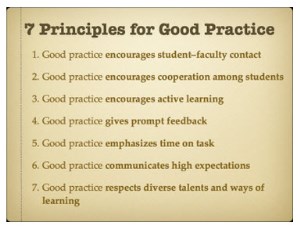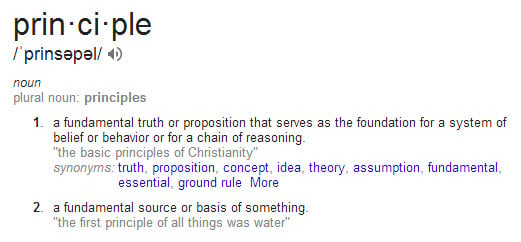One of the “fundamental truths” that has informed my teaching for the past decade has been the seminal work by Arthur Chickering and Zelda Gamson back in 1987 – “Seven Principles of Good Practice in Undergraduate Education” – in which they synthesize fifty years of research to develop their seven principles.
 Arthur Chickering and Stephen Ehrmann updated this in 1996 with their article “Implementing the Seven Principles: Technology as Lever.” They noted:
Arthur Chickering and Stephen Ehrmann updated this in 1996 with their article “Implementing the Seven Principles: Technology as Lever.” They noted:
“Since the Seven Principles of Good Practice were created in 1987, new communication and information technologies have become major resources for teaching and learning in higher education. If the power of the new technologies is to be fully realized, they should be employed in ways consistent with the Seven Principles. Such technologies are tools with multiple capabilities; it is misleading to make assertions like “Microcomputers will empower students” because that is only one way in which computers might be used.”
Fast forward to 2014. In the past two decades, “new technologies” have moved from desktop computing to smartphones, iPads, and Google Glasses. The web has become ubiquitous…I now get emails from my car.
Yesterday, the Pew Research Center released “Digital Life in 2025.” Based on survey responses from over 1,500 people, it suggests that the future world in which we will work and teach will have the web woven invisibly in our lives and those of our students; that global connectivity could lead to more relationships and less ignorance; and while a revolution might occur in education, the divide between “haves” and “have-nots” could grow. Also, while networks might grow and become more complex, human nature is not changing as rapidly. Fifteen themes were noted:
“More-hopeful theses
1) Information sharing over the Internet will be so effortlessly interwoven into daily life that it will become invisible, flowing like electricity, often through machine intermediaries.
2) The spread of the Internet will enhance global connectivity that fosters more planetary relationships and less ignorance.
3) The Internet of Things, artificial intelligence, and big data will make people more aware of their world and their own behavior.
4) Augmented reality and wearable devices will be implemented to monitor and give quick feedback on daily life, especially tied to personal health.
5) Political awareness and action will be facilitated and more peaceful change and public uprisings like the Arab Spring will emerge.
6) The spread of the ‘Ubernet’ will diminish the meaning of borders, and new ‘nations’ of those with shared interests may emerge and exist beyond the capacity of current nation-states to control.
7) The Internet will become ‘the Internets’ as access, systems, and principles are renegotiated.
8) An Internet-enabled revolution in education will spread more opportunities, with less money spent on real estate and teachers.
Less-hopeful theses
9) Dangerous divides between haves and have-nots may expand, resulting in resentment and possible violence.
10) Abuses and abusers will ‘evolve and scale.’ Human nature isn’t changing; there’s laziness, bullying, stalking, stupidity, pornography,dirty tricks, crime, and those who practice them have new capacity to make life miserable for others.
11) Pressured by these changes, governments and corporations will try to assert power—and at times succeed—as they invoke security and cultural norms.
12) People will continue—sometimes grudgingly—to make tradeoffs favoring convenience and perceived immediate gains over privacy; and privacy will be something only the upscale will enjoy.
13) Humans and their current organizations may not respond quickly enough to challenges presented by complex networks.
14) Most people are not yet noticing the profound changes today’s communications networks are already bringing about; these networks will be even more disruptive in the future.
15) Foresight and accurate predictions can make a difference; ‘The best way to predict the future is to invent it.’”
As we continue our 30-Day Challenge sparked by Enoch Hale, my question really rolls out of number 14 above…Day 5: If today’s hyperconnected communication networks are bringing about fundamental changes to our work and study environments, are the Seven Principles of Good Practice still relevant or in need of update?
The Seven Principles have been my go-to lens for determining practical teaching applications, such as the use of blogs for reflection and commentary in the majority of my classes. Encouraging social media opens up opportunities for faculty-student contact and reciprocity and cooperation between students. The open, social and participatory web enables the provision of prompt feedback – from both faculty and students. Time on tasks can be manifested both inside a classroom and on the cloud between classes. Multiple pathways respect diverse talents and ways of learning. The Seven Principles work for me.
But rather than viewing teaching through the lens of the Seven Principles, perhaps first I need to view the Seven Principles through the lens of digital life. Are new principles suggested:
- by the availability of big data?
- by 24/7/365 access?
- by “open”?
- by … ?
Another Pew report from 2012 – “Networked and Hyperconnected: The New Social (and Work) Operating System” – asked if the brains of multi-tasking teens and young adults are wired differently {not a given}, will they be better (adept at finding answers and solving problems) or worse (lack deep-learning skills, social skills, and depend on the web in unhealthy ways). Answering the question about the Seven Principles might better adapt us to creating learning situations that work to enhance learning rather than reinforcing poor practices.
Stowe Boyd in the Digital Life report noted that “we have already entered the post-normal.” In this post-normal world, what are the principles we should use to guide our teaching?
Thoughts?
(…and be sure to check out good questions being posed by Enoch Hale and Jeff Nugent as part of this 30-Day Challenge. Join us!)




How can we use technology to manage the explosion of data? The effort needed to manage the amount of data in our lives precludes the time to assimilate the data into useful knowledge, let alone allow that knowledge to season and nature into wisdom. This is a question of priorities. But priority setting has been complicated by massive data driven distraction.